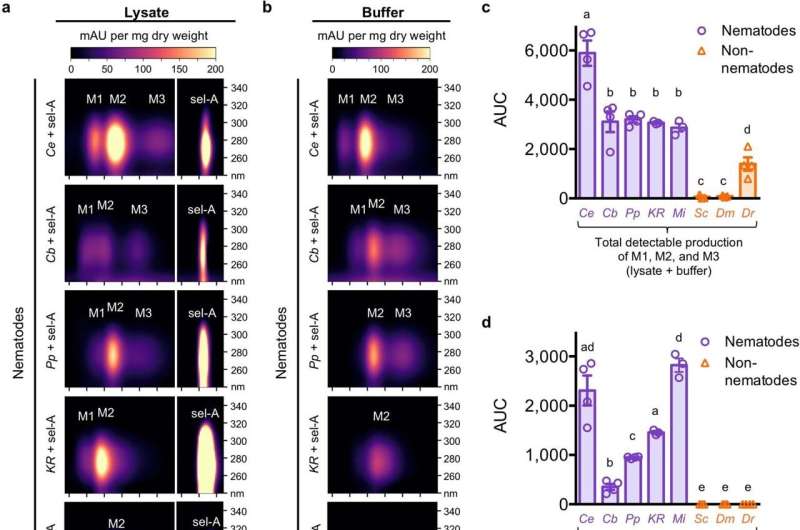May 26, 2023 report
This article has been reviewed according to Science X's editorial process and policies. Editors have highlighted the following attributes while ensuring the content's credibility:
fact-checked
peer-reviewed publication
trusted source
proofread
Selectivin found to kill crop-parasitizing nematodes without killing other organisms in the soil

A team of horticulturists affiliated with a host of institutions in Canada and the U.S. has found a chemical that kills crop-parasitizing nematodes in the soil without killing other organisms. The study is reported in the journal Nature. The editors of the journal have also published a Research Briefing in the same issue outlining the work done by the team on this new effort.
As the world population continues to grow, scientists are seeking ways to feed them. One such effort is focused on increasing yields of existing crops by reducing losses due to organisms that eat or parasitize them, such as nematodes. Certain types of nematodes have been identified as a main target of research because they cause more than $100 billion in crop losses around the world each year.
Prior efforts to protect crops from nematodes have revolved around the use of pesticides. Unfortunately, virtually all of them also kill helpful organisms in the soil. Thus, the search for a safer nematicide has continued. In this new effort, the research team tested the effectiveness and safety of a chemical called selectivin. Prior research in 2016 found that it is chemically similar to a drug called levamisole and that it kills nematodes.
The team began by learning more about what happens when nematodes are exposed to selectivin. They found the tiny creatures absorb the chemical and once they do, enzymes called cytochrome P450s are modified, turning them into toxic chemicals. They also found that soil-based oxygen is required for the modification to take place. Further testing showed that things were different for other organisms in the soil—when they absorbed the chemical, they did not convert any proteins into toxic chemicals. Thus, the chemical appeared to kill only nematodes in soil.
To find out if the chemical would work as hoped in the real world, the team collaborated with the USDA, testing the impact of treating soil with selectivin in a greenhouse growing tomato plants. The team found it controlled the nematodes as well or better than other commercially available products, but unlike those products, it did not harm other organisms in the soil.
More testing is required—typically, pesticides undergo a decade of testing before they are approved for use on commercial crops, but the team is optimistic that they have finally found a solution to the problem of nematodes.
More information: Andrew R. Burns et al, Selective control of parasitic nematodes using bioactivated nematicides, Nature (2023). DOI: 10.1038/s41586-023-06105-5
Parasitic nematodes activate chemicals that can kill them, Nature (2023). DOI: 10.1038/d41586-023-01498-9
Journal information: Nature
© 2023 Science X Network





















